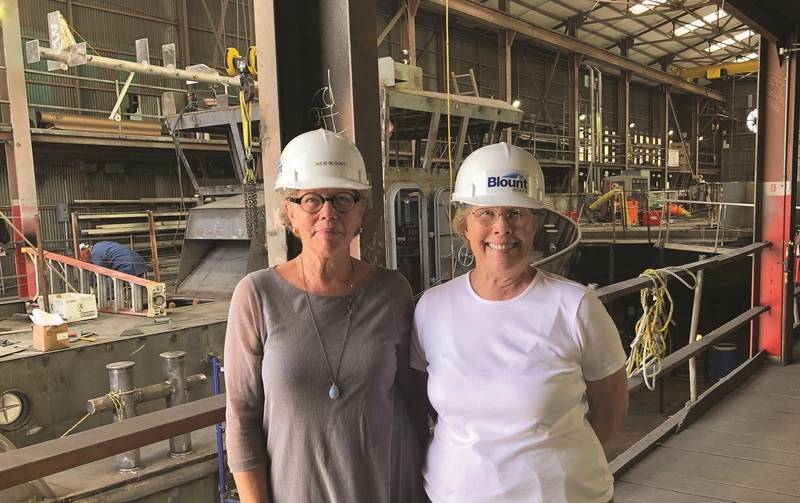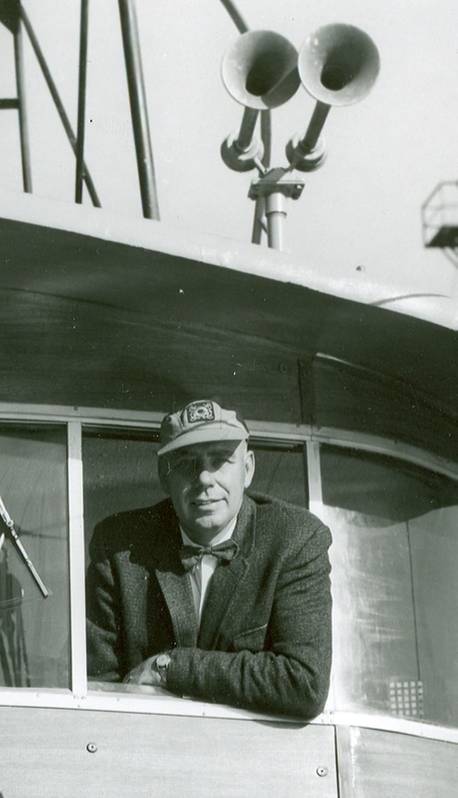‘It’s in Our Blood!’ Blount Boats Celebrates 75 Years
Seventy-five years in business is no small feat, especially in an industry that is tougher than most: shipbuilding. Blount Boats is celebrating the impressive milestone this year.
Established in 1949, the Warren, R.I. shipbuilder is led today by founder Luther H. Blount’s daughters: president and CFO Marcia Blount and executive vice president / human resources Julie Blount, who see their roles as more than a career. “It’s our vocation,” Julie said. “It’s in our blood!” the sisters said nearly simultaneously.

An entrepreneur and inventor by nature, Luther H. Blount formed Blount Boats after building a small twin hull raft built of 55-gallon drums used for transporting oyster and clam shells across Narragansett Bay, prompting requests to build larger steel vessels.
Luthor’s first commercial build was a 77-foot steel catamaran, followed by a fuel oil service vessel using a similar design he called the "twin tube," featuring two cylindrical floats. This success led to the development of larger and more complex monohull vessels, and over time, the shipyard expanded.

Marcia and Julie became fully immersed at a young age. “We grew up right in the middle of the shipyard watching the boats being built,” Marcia said. “Our garden was next to the shear shed.”
“And not only that, but we took trips on boats that my father built for his leisure,” Julie added. “We'd go out sword fishing, we would take trips up to Canada. We were on boats all the time. That was how we grew up.”
Today, Blount Boats is a full-service shipyard offering design, newbuild and repair for vessels up to 220 feet in length. Its diverse customer base is comprised of a variety of commercial and government entities including private and public vessel operators.
To date, Blount Boats has delivered more than 379 hulls and counting, including passenger and vehicle ferries, stern trawlers, offshore supply vessels (OSV), dinner boats and small cruise vessels. In recent years Blount has built U.S. flagged crew transfer vessels (CTV) for the offshore wind sector.
Marcia emphasized Blount Boats’ focus on quality, ingenuity and practicality. “We are famous for the quality of our boats,” she said. “Our boats last for years and years, and the clients have very few issues with them. One reason for the quality of the vessels is that we have very skilled craftsmen that have been with us for many years.”
Marcia and Julie highlighted the experience and expertise of their engineering department as one of the yard's strengths. This team includes their nephew, Luthor Blount, who is the third generation to work at Blount Boats.
“Our engineering department has designed vessels that we have actually run; we have actually operated vessels,” Marcia said in reference to the value of hands-on experience in vessel operations.
Julie said, “Our engineering department works closely with our clients to help them understand what is truly needed to build a boat that functions well. And they give extremely good advice to possibly change some of the plans to make the boat better.”
The Blount team brings decades of experience and valuable expertise to their partnerships with clients. Their goal is always to build the best vessel possible. “It's a very collaborative effort with our clients. We have our own designs, and we also build from plans of naval architects. But we often modify some of those plans to make them more practical and workable,” Marcia said. “Our men say there's the right way, the wrong way, and the Blount way. They believe they know how to build a good boat, and they're going to build it.”
This approach has worked well for Blount Boats, even in the early days. “Often with my father, a client would come in and would tell my father what he wanted, and then my father would stop him and say, ‘Well, what's the run of this boat? Where is she going? How fast do you want to get there?’ And then my father said, ‘Well, this is the boat that I'm going to build for you.’” Marcia said. “‘This is what you need.’”
In the end, the vessels that are built are distinctively Blount. “Because we've been around so long, there are a lot of people that are familiar with and have operated our boats. And what they always say is that [our boat] was their favorite to operate and how it was definitely a Blount boat,” Julie said. “That's a testament to the type of boat that we build.”
“People often comment that we’re synonymous with quality, longevity and low maintenance,” Marcia added.
Drawing on decades of experience, Blount Boats skillfully combines proven design and shipbuilding practices with a trailblazing approach. "My father was really open to innovation," Marcia said.
“Over the years, [my father] designed and built some iconic boats that actually launched industries in themselves,” Julie said. “For the fishing industry, for the offshore gas and oil business down in the Gulf, the dinner boat business, the small cruise boats—boats that really changed the way things happened.”
Luthur passed away in 2006, but Marcia and Julie have continued to lead the company with their father’s spirit, always with an eye on new horizons. “We look for opportunities the same way my father would,” Marcia said.
Blount Boats was the first shipyard to construct a purpose-built CTV for the emerging U.S. offshore wind sector, and it has since built several more. The company is preparing to deliver its next CTV in the coming weeks.
As technologies evolve, Blount Boats is exploring opportunities in areas such as alternative fuels and uncrewed and autonomous vessels.
“We're carrying on my father's legacy,” Marcia said.
